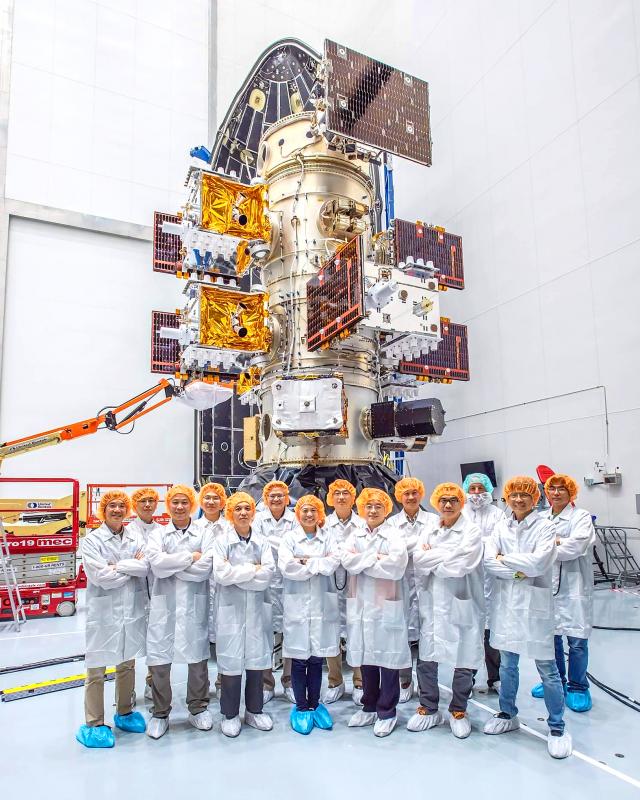The Executive Yuan yesterday passed a draft space development bill, which would provide a legislative basis for space-faring rocket launch sites and regulations for Taiwanese actions in space, marking the nation’s intent to boost space-related industries.
Executive Yuan Secretary-General Li Meng-yen (李孟諺) made the announcement at a news conference after a regular Cabinet meeting, at which the Ministry of Science and Technology (MOST), which oversees the National Space Organization, presented the draft bill.
Premier Su Tseng-chang (蘇貞昌) had approved the third phase of the national space project when he took office in 2019, Li said, adding that the space industry is among the “six core strategic industries” touted by President Tsai Ing-wen (蔡英文).

Photo courtesy of the National Space Organization
Tsai singled out the space industry at a national security event on Wednesday, stating that government investment in the sector is building a rudimentary backbone for the industry, especially in the fields of rocket launches and satellite construction, Li said.
Taiwan’s leading position in semiconductor manufacturing, as well as its advantage in information technology and precision machinery manufacturing, lend it an edge in the development of a space industry, Su said at the meeting.
That Taiwan could make advances into space is no longer a dream, but a viable reality, Su said.
The proposed law would enable specific organizations and companies to promote space-related businesses, in addition to NT$25 billion (US$882.46 million) set aside for the national space project.
The MOST, the Ministry of Economic Affairs, the Ministry of Transportation and Communications and the Ministry of National Defense should work together to develop the space industry sector so Taiwan would be capable of launching its own satellites into orbit, Su said.
The draft has detailed regulations on how launch sites are to be defined and what regulations they would have to abide by, as well as what fines and penalties companies would face for breaching the regulations.
The penalties and fines should adequately compensate for accidents that occur at such sites, the proposed law says.
Launch sites should be established with environmental protection and sustainable development principles in mind, and the bill has several clauses regarding launch site locations, including regulations for Aboriginal traditional land, the MOST said in a news release.
The government should seek private investment, and offer sufficient incentives to help companies collaborate with foreign nations and foster talent to build a healthy space industry, the bill says.
The nation is scheduled to launch a weather observation satellite named Triton next year, followed by the launch of the Formosat-8 constellation’s first satellite in 2023 and a second in 2024, as well as a low-orbit communications satellite named Beyond 5G in 2025, the MOST said.

Conflict with Taiwan could leave China with “massive economic disruption, catastrophic military losses, significant social unrest, and devastating sanctions,” a US think tank said in a report released on Monday. The German Marshall Fund released a report titled If China Attacks Taiwan: The Consequences for China of “Minor Conflict” and “Major War” Scenarios. The report details the “massive” economic, military, social and international costs to China in the event of a minor conflict or major war with Taiwan, estimating that the Chinese People’s Liberation Army (PLA) could sustain losses of more than half of its active-duty ground forces, including 100,000 troops. Understanding Chinese

The Ministry of Foreign Affairs (MOFA) yesterday said it is closely monitoring developments in Venezuela, and would continue to cooperate with democratic allies and work together for regional and global security, stability, and prosperity. The remarks came after the US on Saturday launched a series of airstrikes in Venezuela and kidnapped Venezuelan President Nicolas Maduro, who was later flown to New York along with his wife. The pair face US charges related to drug trafficking and alleged cooperation with gangs designated as terrorist organizations. Maduro has denied the allegations. The ministry said that it is closely monitoring the political and economic situation

UNRELENTING: China attempted cyberattacks on Taiwan’s critical infrastructure 2.63 million times per day last year, up from 1.23 million in 2023, the NSB said China’s cyberarmy has long engaged in cyberattacks against Taiwan’s critical infrastructure, employing diverse and evolving tactics, the National Security Bureau (NSB) said yesterday, adding that cyberattacks on critical energy infrastructure last year increased 10-fold compared with the previous year. The NSB yesterday released a report titled Analysis on China’s Cyber Threats to Taiwan’s Critical Infrastructure in 2025, outlining the number of cyberattacks, major tactics and hacker groups. Taiwan’s national intelligence community identified a large number of cybersecurity incidents last year, the bureau said in a statement. China’s cyberarmy last year launched an average of 2.63 million intrusion attempts per day targeting Taiwan’s critical

AGING: As of last month, people aged 65 or older accounted for 20.06 percent of the total population and the number of couples who got married fell by 18,685 from 2024 Taiwan has surpassed South Korea as the country least willing to have children, with an annual crude birthrate of 4.62 per 1,000 people, Ministry of the Interior data showed yesterday. The nation was previously ranked the second-lowest country in terms of total fertility rate, or the average number of children a woman has in her lifetime. However, South Korea’s fertility rate began to recover from 2023, with total fertility rate rising from 0.72 and estimated to reach 0.82 to 0.85 by last year, and the crude birthrate projected at 6.7 per 1,000 people. Japan’s crude birthrate was projected to fall below six,